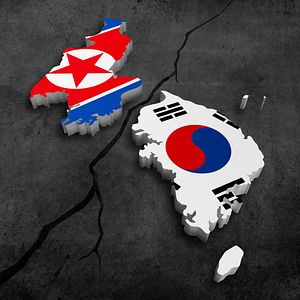For any Koreanists or casual Korea watcher even partially connected to the mediascape, it is hard (if not impossible) to avoid getting swept away in the frenzied discourse on North Korea’s “preparation for military action.” South Korea’s resumption of propaganda audio blasts across the DMZ, a modest response to the maiming of two ROK soldiers who stepped on a land mine likely planted by the North Koreans, has precipitated the latest round of threats from Pyongyang (and even some artillery shells).
Contingency and miscalculation are ever-present, but as Roger Cavazos, retired defense analyst for the U.S. Army and current Nautilus Institute consultant, lays out in a series of tweets (read his tweets for August 21) the chances are low – very low – that something devastating, like war, happens. His bottom line: This is an old game, and we’ve been here before; act like it.
There are some more interesting questions that can be asked regarding the regularity of threat exchanges between North and South Korea. One is: How might brinkmanship and occasional conflagrations change South Korea’s perception of North Korea as a threat? This is an issue that has been taken up by recent public opinion studies in South Korea, most notably by the Asan Institute for Policy Studies.
In a February 2015 report entitled “South Korean Attitudes Toward North Korea and Reunification,” Asan finds that, among age cohorts, “Those in their twenties feel more distant toward North Korea than any other cohort.” Using the same data cited in the report, I co-authored a piece for CSIS PacNet with then-Asan program officer and polling analyst Karl Friedhoff (now of the Chicago Council) that explored the identity and attitudes of young South Koreans. We found, with regards to “perceptions of North Korea,” that those in their 20s were less likely to see the North as “one of us” and more likely to see it as an “enemy.”
The reasons for those are manifold and not all are related to a perception of threat (no one feels close to an “enemy”). There is a clear and increasingly expanding values and identity gap between North and South Koreans. Those in the South, especially younger South Koreans, have no memory of a unified Korea, nor do they share a sense of solidarity with the minjung or student movements of the 1980s and 1990s, which sought to cultivate ethnic (read: national) ties with fellow Koreans in the North. Younger South Koreans embody a more distinctive South Korean national identity.
This distinct South Korean national identity matters, because those coming of age in a post-minjung democratic society are going to interpret North Korean bellicosity in a different way. Rather than cause something like “south-south conflict” (discord within South Korea itself on how to approach the North), as happened so often in the past, North Korean belligerence is likely to generate either indifference or frustration today. The latter is somewhat worrisome and might be the sort of sentiment that Park Geun-hye is tapping into with her “’disproportional response’ theory of deterrence,” the post-Yeonpyong doctrine discussed by Professor John Delury.
Hopefully, South Korea’s newfound nationalism is, as Joshua Stanton once described it, “sober, pragmatic, and grouchy.” Grouchy pragmatists don’t support unnecessary wars.
































